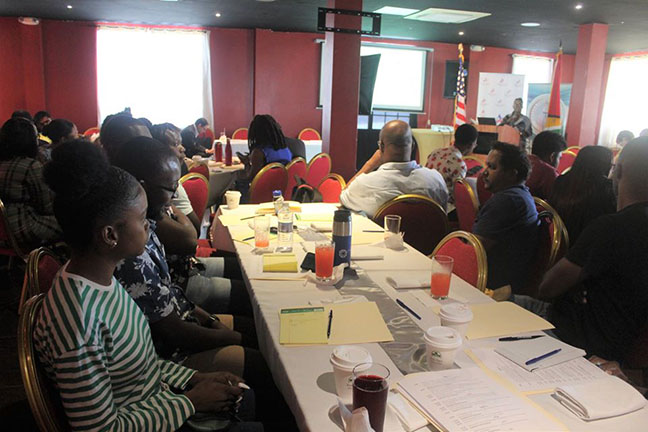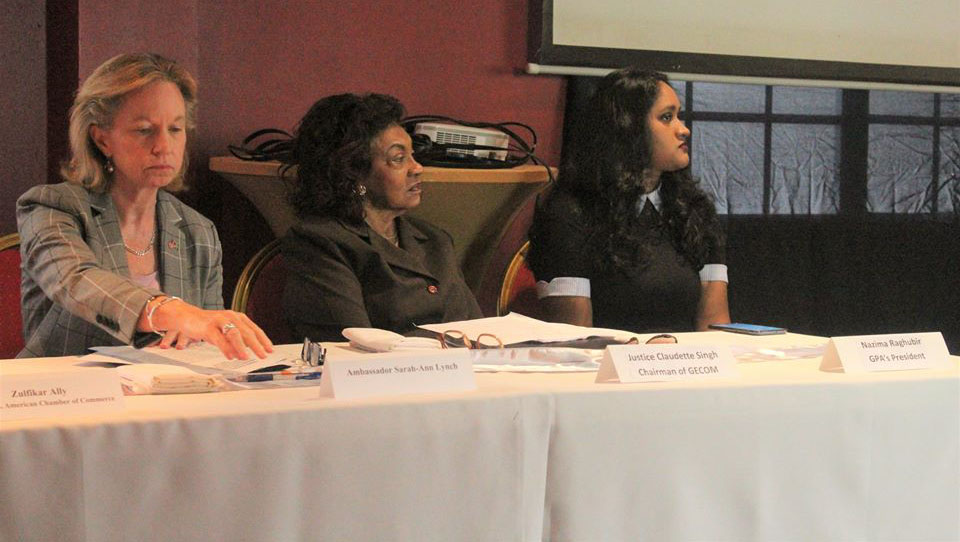Chairperson of the Guyana Elections Commission (GECOM) Justice Claudette Singh yesterday said that the March 2nd general elections will be free, fair and transparent.
She was speaking at a media training seminar on elections which was held by the Guyana Press Association (GPA) in collaboration with the Guyana Chapter of the American Chamber of Commerce (AmCham) at Palm Court.
“With so many safeguards implemented at every polling station, inclusive of parties, election agents, local and international observers, the Guyana Elections Commission is cognizant that it will deliver free, fair and transparent elections on March 2, 2020,” she said. Justice Singh also urged media professionals to practice responsible journalism and to avoid sensationalizing their stories.

“Already I have watched, listened to and read some very disconcerting stories and all I have to say is sensationalized reporting is irresponsible journalism particularly when our elections is just around the corner,” Justice Singh lamented.
She said, irresponsible journalism tends to evoke emotions and may also stimulate mistrust and violence in an “already charged” environment.
“In the interest of peace and stability…. Resist the spin, contextualize your story, and avoid self-censorship,” Justice Singh urged. “You must be careful and responsible in your reporting on any Election Day incident. Do not sensationalize your stories. Ensure that you have credible information. Be aware of hearsay reports. Do not act on them unless you have verified your stories,” she added.
Also delivering remarks yesterday was US Ambassador to Guyana Sarah-Ann Lynch. She said that observers had recorded that the media were “partisan” during their coverage of the last elections and called on media workers to practise fair and accurate journalism as the country prepares to host another elections.
“…In assessments of the media environment during the 2015 elections in Guyana, some observers recorded that the media were partisan in their election coverage. While observers noted that (there was a) diverse range of content and opinion across the media, some of these assessments recorded that very little of the coverage was neutral and unbiased,” the Ambassador said.
Lynch told reporters that the upcoming elections is their opportunity to “more faithfully” convey unbiased information to the citizens of the country.
“Media all around the world can surely do better in meeting the high but essential standards of independence and neutrality,” she said. In doing so, Lynch asserted that the press will display its leadership role as the purveyor of facts and balanced analysis on the elections.
“That leadership can yield a virtuous cycle of citizenship because well-informed citizens can better hold their political leaders accountable,” she added. In order to fulfill its highest civic purpose, Lynch noted that the press should be both independent and unbiased.
“Without independence, a media outlet functions as a public relations mouthpiece for whatever government, industry or powerful interest controls or exercises direct influence over the outlet,” she said.
President of the GPA Nazima Raghubir said that at this “often tense” period, the media ought to ensure that they carry out their duties in a manner that will foster social cohesion.
“I feel our credibility is the only value we can have in this profession and if you are serious about what you do, what we do and real journalism, you will work to ensure that you check every box to provide fair, balanced stories than can inform rather than incite in this period and beyond,” Raghubir stated.
As journalists battling with social media to present news in real time, Raghubir said it has become more challenging to present accurate information. However, despite, this she said remaining credible is essential.
“More than ever, our jobs have placed us in a position to amp up the level of our fact checking, put a greater effort into striking balance, digging deeper to present stories with all the facets of fairness and to present information without prejudice. This has proven to be very tricky and sometimes dangerous as journalism battles with social media to present news in real time, break stories in a competing business environment while …doing this with shrinking newsrooms,” she said.
The two-day training will provide media workers with an insight into key areas such as Guyana’s electoral laws and system/statutory deadlines, elections results, elections coverage/media, understanding manifestos, social media and disinformation and defamation and political coverage, etc in preparation for the March 2nd elections coverage.





